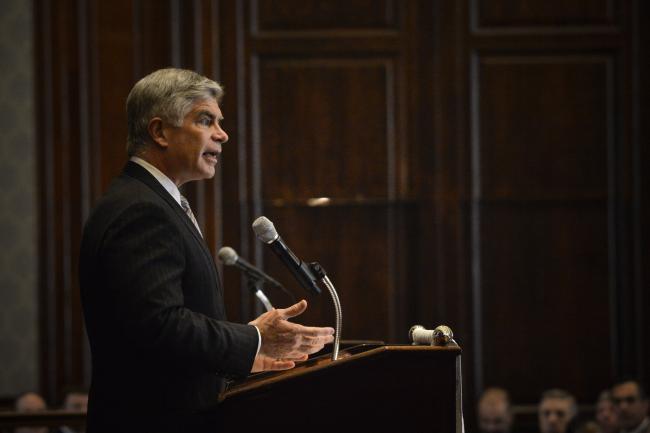(Bloomberg) -- The U.S. central bank should take its time before raising interest rates again to avoid inverting the yield curve and because inflation is still low, said Federal Reserve Bank of Philadelphia President Patrick Harker.
In remarks Friday during the annual meeting of the American Economic Association in Philadelphia, Harker also revealed a dovish rate call for 2018: two hikes instead of the median estimate of three forecast by Fed officials in quarterly estimates last month.
“I want to be slow and steady with any additional rate increases,” he told reporters. “At this point, I don’t think we should do anything that would precipitate any inversion of the yield curve, or other things.”
U.S. central bankers are trying to strike a balance between a hot labor market that’s driven unemployment to the lowest level since 2000, and weak inflation which remains under their 2 percent target and has for most of the last five years.
They raised rates in December and discussed what a flatter yield curve meant for the economy, with some arguing it had traditionally heralded a recession and shouldn’t be ignored. Officials also lifted their 2018 estimates for growth in anticipation of a short-term boost from U.S. tax reform, signed into law by President Donald Trump a few days later.
Harker, who doesn’t vote on monetary policy this year, said he didn’t expect the $1.5 trillion package of tax cuts to have a large impact on economic growth. His St. Louis Fed colleague, James Bullard, took a more optimistic view.
Speaking earlier, Bullard said that while he was still expecting growth to slow a little this year after coming in around 2.5 percent in 2017, he would not be surprised if the tax reforms yielded a longer-term payoff.
“There is some possibility this could light a fire under investment and really drive growth higher,” Bullard, a policy dove who has argued against raising rates, said in an interview on Bloomberg Television with Michael McKee. “I have some sympathy for this idea you would get this investment boom coming out of this tax policy.”
While Bullard said that thus far, he had not changed his call for the Fed to keep rates on hold, “if that happens I would certainly take note of that and adjust policy appropriately.”
In separate comments at the AEA meeting, Cleveland Fed chief Loretta Mester said the U.S. economic expansion was well underway and echoed Harker in calling for a review of the Fed’s policy framework, though she did not personally favor raising its inflation goal.
“Now may be an appropriate time to undertake such study because the economy is growing, labor markets are strong, and inflation is projected to move back to our goal,” she said.
